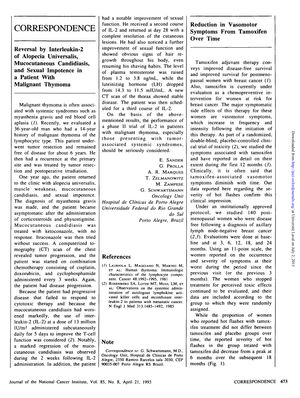Reversal by Interleukin-2 of Alopecia Universalis, Mucocutaneous Candidiasis, and Sexual Impotence in a Patient With Malignant Thymoma
April 1993
in “
Journal of the National Cancer Institute
”

TLDR Interleukin-2 treatment improved hair growth, sexual function, and reduced fungal infection in a patient with thymoma-related symptoms.
In 1993, a 36-year-old male patient with a 14-year history of malignant thymoma of the lymphocytic type, who had undergone tumor resection and postoperative irradiation, presented with alopecia universalis, muscle weakness, mucocutaneous candidiasis, and sexual impotence. After unsuccessful treatments for his conditions, including corticosteroids, physostigmine, ketoconazole, and itraconazole, as well as chemotherapy, the patient was administered interleukin-2 (IL-2) at a dose of 13 million IU/m2 daily for 5 days. Following IL-2 administration, the patient experienced marked regression of mucocutaneous candidiasis, improvement in sexual function, and hair regrowth, prompting the resumption of shaving habits. Additionally, the patient's plasma testosterone levels increased from 1.2 to 3.8 ng/mL, and luteinizing hormone levels decreased from 14.3 to 11.5 mIU/mL. The patient's disease remained stable, and he was scheduled for a third course of IL-2. These results suggest that a phase II trial of IL-2 in patients with malignant thymoma, particularly those with tumor-associated systemic syndromes, should be considered.